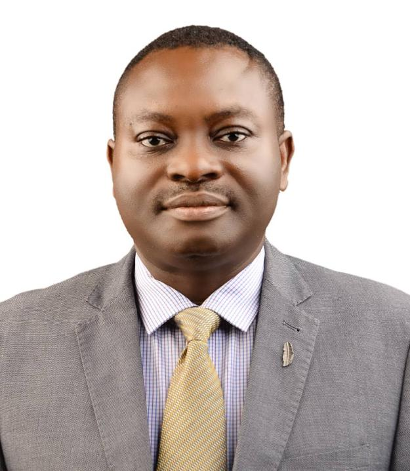- Policy Workshop at AIGFThe Centre, in partnership with United Nations Economic Commission for Africa (UNECA), is building and providing support for an African community of innovative researchers to enhance research capacity and skills development in emerging technology both on the continent and in the University to increase internal and external research and skills development opportunities for faculty, graduate students and post-doctoral fellows. Under this objective, the Centre, United Nations Economic Commission for Africa (UNECA) and Global Network for Cybersolution (GNC) jointly organised and conducted a Policy Workshop Session during the 12th African Internet Governance Forum (AIGF), which was hosted by Nigeria in 2023 at Transcorp Hilton Hotel, Abuja. The session had the theme: Bridging Emerging Technology Skills Divide in Africa, and addressed AIGF’s Digital Divides and Inclusion subtheme, and the Artificial Intelligence (AI) and Emerging Technologies subtheme. The objective of the session was to stimulate discussion, share valuable policy insights, and harness ideas that could be leveraged to bridge the research and emerging technology skills divide in Africa. The session also aimed at promoting research and emerging technology skills inclusion with access to learning kits and job opportunities in the emerging digital economy space. The theme of the session aligned with the dominant theme of the 12th version of the African Internet Governance Forum, Transforming Africa’s Digital Landscape: Empowering Inclusion, Security, and Innovation. The event took place between 19th and 21st September, 2023.
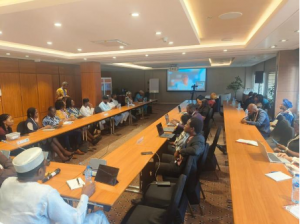
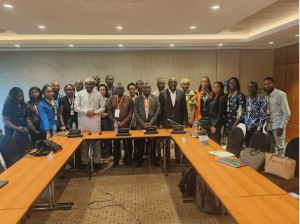
- Global Generative AI Masterclass Series The Centre developed networks with researchers, regulators, and industry players in emerging technology across the public and private sectors, both locally and internationally. It partnered with Global Network for Cybersolution (GNC) nationally and Global Skills Development Council (GSDC) internationally to drive 10 major domains of professional certifications in emerging technology skills. So, in partnership with GNC and GSDC, ICET offered a free Global Generative AI Masterclass series 2023 from 31st October, 2023 – 15th March, 2024.
 The Centre played a key role as a High-Level Strategic Partner in the Bio-economy, Bio-entrepreneurship and Cassava-Bioethanol Value Chain Development Project, designed to create wealth, provide jobs, reduce poverty, improve food security and nutrition, provide renewable energy, and reduce carbon footprint. As a strategic partner in the project, the Centre has been saddled with the mandate to design, develop, and deliver e-learning content for bioeconomy skills, bio-entrepreneurship, biotechnology, and related skills, such as STEM. Further, the Centre has been charged with the responsibility to develop and pilot a variety of blended learning platforms and face-to-face components to improve access to bioenergy resources, enhance and extend the learning environment, provide a variety of bioresource formats, and support continuous professional development. In addition to executing activities that are geared towards the delivery of the foregoing mandates, the Centre is working towards developing and deploying mobile applications that will support competence-based learning in bio-entrepreneurship training methodologies and business models for bio-entrepreneurship start-ups. The North-Central Regional Sensitisation-Stakeholders Roundtable on the Cassava Bioethanol Value Chain Project was held between 4th and 6th July 2023 at Nasarawa State University. The Deputy Vice-Chancellor Administration Prof. Uno Uno ably represented the Vice-Chancellor, Prof. Faruk Adamu Kuta. The Bioethanol Pilot Project Implementation Committee for Federal University of Technology Minna was inaugurated by the Vice-Chancellor, Prof. Faruk Adamu Kuta, on Wednesday, 6th September, 2023.
The Centre played a key role as a High-Level Strategic Partner in the Bio-economy, Bio-entrepreneurship and Cassava-Bioethanol Value Chain Development Project, designed to create wealth, provide jobs, reduce poverty, improve food security and nutrition, provide renewable energy, and reduce carbon footprint. As a strategic partner in the project, the Centre has been saddled with the mandate to design, develop, and deliver e-learning content for bioeconomy skills, bio-entrepreneurship, biotechnology, and related skills, such as STEM. Further, the Centre has been charged with the responsibility to develop and pilot a variety of blended learning platforms and face-to-face components to improve access to bioenergy resources, enhance and extend the learning environment, provide a variety of bioresource formats, and support continuous professional development. In addition to executing activities that are geared towards the delivery of the foregoing mandates, the Centre is working towards developing and deploying mobile applications that will support competence-based learning in bio-entrepreneurship training methodologies and business models for bio-entrepreneurship start-ups. The North-Central Regional Sensitisation-Stakeholders Roundtable on the Cassava Bioethanol Value Chain Project was held between 4th and 6th July 2023 at Nasarawa State University. The Deputy Vice-Chancellor Administration Prof. Uno Uno ably represented the Vice-Chancellor, Prof. Faruk Adamu Kuta. The Bioethanol Pilot Project Implementation Committee for Federal University of Technology Minna was inaugurated by the Vice-Chancellor, Prof. Faruk Adamu Kuta, on Wednesday, 6th September, 2023.
-
-
- FCF Strategic Partnership Visit The Centre has developed mutually beneficial linkages with the FinTech Industry in Nigeria to develop partnerships and collaborative interventions. During a courtesy visit on the President and executive members of the FinTech CEOs Forum (FCF) on 12th July, 2023 in its Secretariat in Ikeja, Lagos State, the Vice-Chancellor, Prof Faruk Adamu Kuta whom the Deputy Vice-Chancellor, Administration ably represented, Prof. Uno Uno, said a strategic ICET-FSI and FCF partnership will harness, nurture, coordinate, and deliver the expertise needed to bridge fintech knowledge gaps in Nigeria and the rest of Africa. The Vice-Chancellor emphasised that the Centre has recognised the need to create and sustain an enabling environment for delivering quality tertiary education and training on blockchain technology, particularly in the areas of its application in the fintech industry in Nigeria. He called for FCF endorsement and designation of ICET as a unique intervention initiative for fintech research, training, innovation, and capacity development through an academia-industry partnership. He sought support for ICET and a partnership in the implementation of Fintech certification programmes. He further prayed for FCF’s participation in the curriculum development of Fintech professional courses at the Centre and an event platform for sharing experiences, coaching, and mentoring. In his response, the President of FCF said FCF, in partnership with FSI, will assist the University in harnessing employment and internship opportunities for its graduates and undergraduates in the Fintech industry.

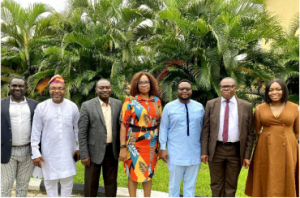
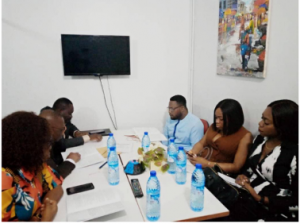
- National Cybersecurity Awareness Month Workshops The Centre has also transferred knowledge to society through outreach activities by organising an essay competition for secondary school students and workshops on Cybersecurity Awareness for three critical stakeholders (government officials, small and medium-sized enterprises (SMEs), and ministries, departments and agencies (MDAs) during the 2023 National Cyber Security Awareness Month NCSAM (October) 2023 As part of activities to mark 2023’s National Cybersecurity Awareness Month (NCSAM) in Nigeria, the International Centre for Emerging Technology (ICET) Federal University of Technology, Minna in partnership with Cybersecurity Education Initiative (CYSED), a dedicated advocate for digital safety education and capacity building organised a one-day Sensitisation Workshop on Cybersecurity Awareness for officials and employees of Niger State Government. The Workshop took place on 10th October, 2023 at the SICT Lecture Theatre II, Federal University of Technology, Minna, Niger State. The Vice-Chancellor of the Federal University of Technology, Minna, Prof Faruk Adamu Kuta was ably represented at the opening ceremony of the event by the Dean, Postgraduate School Prof. O. K. Abubakre. In contrast, Dr. Sadeeq Abubakar, Permanent Secretary, Niger State Ministry of Communications Technology and Digital Economy represented the Honourable Commissioner, Niger State Ministry of Communications Technology and Digital Economy.
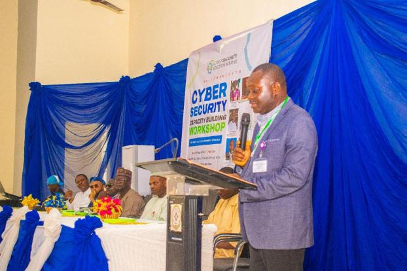
In continuation of its drive for the commemoration of the 2023 National Cybersecurity Awareness Month (NCSAM) in Nigeria, The International Centre for Emerging Technology (ICET), Federal University of Technology, Minna, in partnership with Cybersecurity Education Initiative (CYSED), Trend Micro, Quomodo and Co-Creation Hub, organised a one-day capacity building workshop for Small and Medium-sized Enterprises (SMEs) in Lagos State. The Workshop, which was held on Tuesday, 17th October 2023, at Co-Creation Hub in Yaba, drew participants from over fifty (50) SMEs across Lagos State.
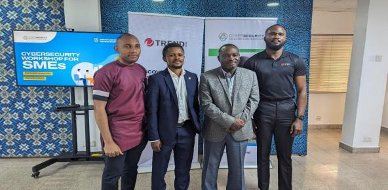
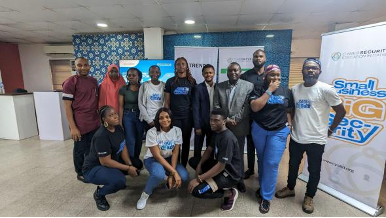
The objective of the Workshop was to sensitise Small and Medium-sized Enterprises on the knowledge gaps in Cybersecurity and to get their buy-in and support for capacity development in Cybersecurity innovation and knowledge space with premium impact on the university ecosystem and industry. Further, the Workshop was organised to help SMEs in Lagos State understand the cyber threats that confront their everyday operations, and how they could cultivate global best practices, and develop the security culture that would be required to foster a secure work environment.
The Federal Government of Nigeria and officials of Ministries, Departments, and Agencies (MDAs) in Nigeria’s Federal Capital Territory, Abuja, have been called upon to protect critical national infrastructure and improve incident response to cyberattacks. The First Secretary and West Africa Cyber Lead, British High Commission Abuja, Andrew Penpreze, made this call in Abuja while making a lead presentation at the Cybersecurity Workshop for MDAs co-organised by the International Centre for Emerging Technology, Federal University of Technology Minna, Cybersecurity Education Initiative (CYSED), Trend Micro, Quomodo, and Nile University, Nigeria. The Workshop, which took place on Thursday, 19th October, was held at Limpopo Bay, Nile University of Nigeria, Abuja.
Andrew Penpreze, who was the special guest at the Workshop, stressed in his presentation, titled Protecting Critical Infrastructure and Incident Response, that awareness was one of the critical aspects of Cybersecurity and called on participants to work towards developing the requisite situation awareness skills and response capabilities required to protect Nigeria’s cyberspace. He enumerated several approaches that relevant government agencies could adopt to improve response to cyber-attacks, and observed that human beings were the weakest link to hackers; therefore, it was essential to create awareness and build their capacities to enhance response. According to him, “you cannot take away the human element, no matter how sophisticated the tech you are using.” 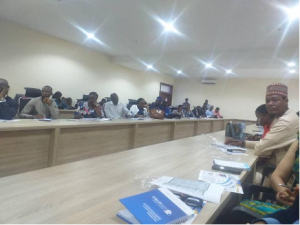
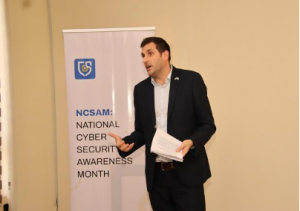
- Emerging Technology Summit Africa (ETeSA 2023) Emerging Technology Summit Africa (ETeSA, 2023) ETeSA, an initiative of ICET/GNC, is designed to bridge the professional knowledge and digital innovation gap in emerging technologies, which will impact the values and competitiveness of emerging professionals in Africa. In pursuit of the objective of this initiative, ICET/GNC/GSDC, in partnership, held the maiden edition of ETeSA featuring a three-day (6-8 June, 2023) Global Webinar on the theme: Industry 4.0 Emerging Skills and the Future of Africa. The topic for day one was Emerging Technology Skills and Opportunities for Africa. Day two had the topic: Data Protection Regulation Model and Opportunities for Africa, while the topic for day three was: Blockchain and Emerging Digital Security Innovations.
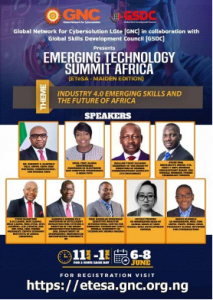
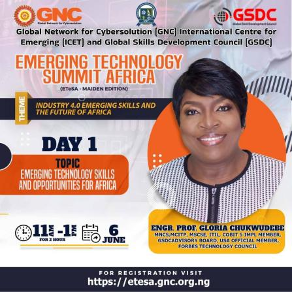
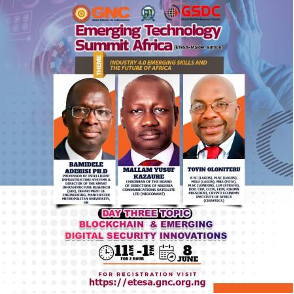
- Global Generative AI Webinar ICET/GNC/GSDC, in partnership, organised and implemented a Global Generative AI Webinar, which was held on 24 – 25 August 2023. The theme of the Webinar was Empowering Innovation: Exploring Generative AI. The Global Generative AI Webinar focused on Artificial Intelligence techniques that involve creating models capable of generating new data, such as images, text, music, and more, in a manner that resembles human creativity. Experts, Researchers, and Practitioners in the field of AI came together to share their knowledge, insights, and advancements related to Generative AI. Participants had the opportunity to learn about the latest trends, best practices, and challenges in Generative AI. They gained a deeper understanding of how these AI models work and explored how they can be integrated into various industries, including art, entertainment, marketing, healthcare, and more. Participants learned to unlock a world of endless possibilities and gained the expertise needed to navigate the exciting future of Generative AI.
-
- FSI Campus Ambassador Programme
The primary purpose of the FSI Campus Ambassador Programme initiative is to provide support to students in tertiary institutions in their journey to tech entrepreneurship, enhance the employability chances of those embarking on a tech career, and promote a culture of innovation on tertiary campuses. The primary goal of the Federal University of Technology, Minna FSI Campus Ambassadors’ Programme is to nurture great ideas and talents among our students and to connect them to mentors and partners. This initiative has two (2) pathways, namely: the pathway for tech entrepreneurs through the FSI business incubation programme, and the pathway to developing a tech career. The FSI Ambassador Programme Lead for Federal University of Technology, Minna, Mr. Mudasiru Rasheed Taiwo, was appointed on 14th October, 2022. His primary role has been to create awareness of the Programme on campus, recruit members, and drive the activities of the Programme in the University under the supervision of ICET.
- FSI Virtual Innovation Lab Launch & Training
In strategic partnership and support, the International Centre for Emerging Technology (ICET), in collaboration with Financial Services Innovators (FSI), established a Virtual Innovation Laboratory in the Centre as a valuable addition to the educational and research ecosystem of the Federal University of Technology, Minna. The Innovation Lab is an initiative that focuses on fostering innovation and creativity in the fields related to entrepreneurship and start-ups. By implementing this innovative platform, the University would empower its students, faculty, and industry professionals to drive innovation, foster collaboration, and address the challenges in key economic sectors in Nigeria and across Africa. The Virtual Laboratory provides a platform for the University community to actively contribute to the development of home-grown innovative solutions to drive the advancement of the financial services sector, education sector, health sector, transportation sector, agricultural sector, energy sector, etc., improve livelihoods, create jobs, boost entrepreneurship, and develop the Nigerian economy with extension to other parts of Africa. The University will benefit from the partnership in the following areas:
- Virtual Platform: The FSI Innovation Lab includes a fully functional virtual platform designed to facilitate innovation and collaboration. This platform serves as a digital hub where students, faculty, and other stakeholders can come together to ideate, develop, and showcase innovative solutions related to technology and start-ups.
- Access to Sandbox: It provides access to a sandbox environment where participants can experiment with ideas and develop minimum viable products (MVPs) related to tech solutions. The sandbox is equipped with the necessary tools and resources for testing and prototyping technology solutions.
- c. Incubation and Mentorship: The Innovation Lab offers programmes and resources for nurturing innovative ideas and incubating them with the innovators. These include mentorship programmes that connect participants with industry experts, successful entrepreneurs, and academic advisors. These mentors provide guidance and support throughout the innovation process.
- Hackathons and Competitions: The Lab organises mini hackathons and competitions to encourage participants to collaborate on solving real-world problems in the technology sector. These events may involve brainstorming, coding, and rapid prototyping to develop innovative solutions.
- Innovation Fairs: The Lab also hosts innovation fairs to showcase the outcomes of its programmes and initiatives. These fairs serve as platforms for presenting innovative projects, MVPs, and start-ups to a broader audience, including key stakeholders in the technology ecosystem.
- f. Primary Objectives: The primary objectives of the FSI Innovation Virtual Lab are to foster a culture of innovation and creativity within the university, showcase innovative solutions developed within the Lab to address real problems in Nigeria and Africa, raise the next generation of tech leaders, and build a talent pipeline for the tech ecosystem, particularly in the tech ecosystem.
- Action Memo for Amendment to Cybercrime Act 2015.
The Director of the International Centre for Emerging Technology, Federal University of Technology, Minna, was invited as a critical stakeholder to the Public Hearing of the Cybercrimes Act 2015 Amendment Bill 2023, organised by the joint Committees of Senate on ICT and Cybersecurity, and National Security and Intelligence. On behalf of the Centre, the Director submitted a memo which sought to broaden the scope of the Cybercrime Act 2015, and to address the dearth of knowledge in Cybersecurity research and development, capacity building in Cybersecurity, and cooperation in Cybersecurity in Nigeria. The Memo provided recommendations that would: (i) Expand the scope of the Cybercrime Act 2015, (ii) Improve investment to support Cybersecurity Research and Development, (iii) Drive innovation and capacity development in Cybersecurity.
- Courtesy Visit to the Nigeria Data Protection Commission
The Management of the University paid a courtesy visit to the Management of the Nigeria Data Protection Commission. The visit was to, among other things, enable the University, through the International Centre for Emerging Technology, to explore possible ways and platforms for collaboration and partnership for mutual benefit, having in mind the University’s mandate and passion to distinguish itself in cutting-edge research and innovation in Information and Communication Technology (ICT). The Vice-Chancellor sought designation of the International Centre for Emerging Technology (ICET), Federal University of Technology, Minna as a National Centre of Excellence in Data Privacy and Policy in Nigeria to bring together in strategic collaboration the academic community, government, industry, technical community, development partners, technology thought leaders at national and international level on strengthening the coordination of Data Protection and Pivacy governance in Nigeria.
- Memorandum of Understanding with Great Green Gona Nigeria Limited (GGGNL) On the platform of the Centre, the University signed a Memorandum of Understanding with Great Green Gona Nigeria Limited. The key areas of cooperation between GGGNL and the University included: Research and development of new technologies, products, and approaches to address malnutrition and food insecurity. Capacity building and training for students, researchers, and other stakeholders in the bio-fortification of food and cash crops. Joint implementation of projects and programmes to address specific agricultural technology needs and challenges in the country, and sharing of resources, expertise, and knowledge between the two organisations, among others.
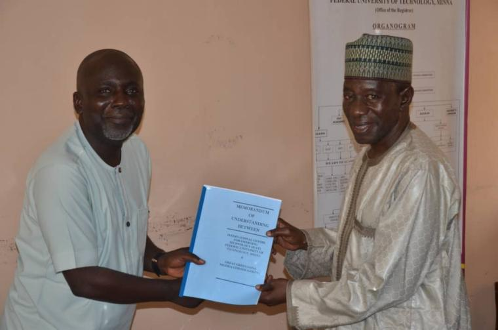
13 Memorandum of Understanding with Fintech Development and Advocacy Initiative (FSI). The objective of the MoU was to collaborate with the University to institutionalise the Virtual Innovation Lab within its campus. The lab would be set up to drive innovation, mentorship and training among the students and staff (academic and non-academic) of the University. The initiative is designed to create an inclusive and collaborative virtual ecosystem that promotes innovation, creativity, and knowledge exchange within the financial services sector, health, agriculture, transportation, energy, and the tech ecosystem at large. The Virtual Innovation Lab will facilitate research and development initiatives by providing a platform for experimentation, ideation, product development and collaboration with incumbent players or peer mentors in Nigeria and across Africa. The Lab will also serve as a hub for students, faculty, industry professionals, and entrepreneurs to drive innovation and contribute to advancing financial services and other technology-driven industries. 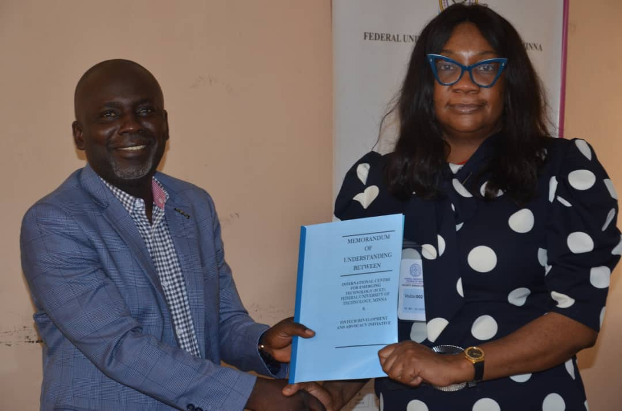
- University Senate’s Approval of two Postgraduate Programmes for the Centre. In its meeting of 29th May, 2024, the Senate approved two postgraduate courses for the Centre to be run by the Postgraduate School. The courses were Postgraduate Diploma in Fintech and Financial Blockchain, and Professional Master’s of Technology in Fintech and Financial Blockchain.
- The 2025 National Tech Rally. In partnership with High Tech Centre for Women and Youth, the Centre, the International Centre for Emerging Technology (ICET), co-hosted the annual Nigerian Tech Rally, Expo, and Exhibition. This event brings Nigerians, home and abroad, policy actors, and stakeholders in the STEM and tech ecosystem together in a national discourse for tech development. The Forum, designed to mobilise Nigerian citizens, and bring together multi-stakeholders in the tech space (including the diaspora), policymakers, tech thought leaders, tech businesses, knowledge institutions, heads of tech-related organisations in the informal sector, financial institutions, development partners, NGOs and CBOs in interactions that are intended to catalyse discussions and engagements in policy development, integration and implementation across the STEM (science, technology, engineering, mathematics) disciplines, digital, and innovation entities, and related cognate sectors both at the federal and state level. The Nigeria Tech Rally 2025 Forum, which was held on Monday, January 27th, 2025, had the theme Building and Developing Cottage Tech Solutions for Societal Transformation in the Renewed Hope Digital Era. The event featured a media chat session, keynote speeches, a plenary session, and panel discussions. Participants gained insights into the processes that underlie the development of tech policies, policy implications of science, technology, and innovation related to SDGs, for national development among others. These insights equipped the participants with the knowledge required to engage governments at all levels on how to meet citizens’ expectations within the context of the development of indigenous technological inventions, innovations, and improvement of the local manufacturing capacity of cottage technologies.
- The 2025 National Girls in ICT Day. To strengthen its partnership and engagement with High Tech Centre for Nigerian Women and Youth, the Centre, in collaboration with High Tech, hosted the Girls in ICT Day and Celebration of the 20th Edition of Nigeria’s Children ICT Summit in Abuja and ten (10) other states in Nigeria. The event took place on 21st- 22nd May, 2025. With the theme, Empowering Future Innovators: Advancing ICT, STEAM, and Entrepreneurship in Schools, the Girls explored discussions around digital inclusion and transformation in tech-based self-employment and innovation education, while the boys focused on how to engage their innovative capabilities to transform ideas into market strategies that foster workforce development. The Youth (male and female) in parallel sessions learned how to promote digital inclusion through the formation of relevant ICT clubs, empowering them with tech skills as young product designers, and how these activities would foster innovation, promote practical designs, and engagement. On day one, the participants learned to produce a “Home Automation System.” On day 2, critical stakeholders held discussions in plenary and panel sessions. The highlight of day two was the inauguration of. 3 clubs for the students who will serve as These were: Data Privacy Club championed by the National Data Protection Commission (NDPC), Sustainability Club championed by the Telecommunications and Technology Sustainability Working Group (TTSWG), and supported by IHS Towers Nigeria, and the Innovators and Inventors Club powered by the Association of Nigeria Inventors and Innovators.
- Web3Bridge SIWES Scheme The Centre facilitated a strategic relationship between the University and the tech industry by engaging with Web3Bridge to engage interns from the School of Information and Communication Technology of the University for the 6-month mandatory Students Industrial Work Experience Scheme (SIWES). Twelve of our students have already been onboarded into the Scheme. It is heartwarming that arrangements to sign an MoU between the University and Web3Bridge are at an advanced stage. The MoU provides for interns from FUT Minna to ideate and develop products that can be further developed after the internship programme. More important is the fact that the interns will be introduced to Web3Bridge incubation partners for further development and improvement on their products, with the possibility of securing grants
- Senior Citizens Tech Summit and Workshop To actualise Nigeria’s drive for digital literacy especially among the senior citizens and the elderly, people above 55 years of age and among those who have retired from active service, High Tech Centre and ICET in collaboration have organised the Senior Citizens Tech Summit and Workshop to not only create awareness on the digital transformation that is sweeping across the nations of the world, but also to teach them the tech skills that are necessary to function effectively in the digital age, and how they can position themselves to maximise the opportunities of the digital age. The Senior Citizens Tech Summit flagged off on 9th July, 2025, with a webinar on Zoom. The event will transition to the face-to-face mode across states in the six geopolitical zones of the country, beginning from 1st August 2025.



 The Centre played a key role as a High-Level Strategic Partner in the Bio-economy, Bio-entrepreneurship and Cassava-Bioethanol Value Chain Development Project, designed to create wealth, provide jobs, reduce poverty, improve food security and nutrition, provide renewable energy, and reduce carbon footprint. As a strategic partner in the project, the Centre has been saddled with the mandate to design, develop, and deliver e-learning content for bioeconomy skills, bio-entrepreneurship, biotechnology, and related skills, such as STEM. Further, the Centre has been charged with the responsibility to develop and pilot a variety of blended learning platforms and face-to-face components to improve access to bioenergy resources, enhance and extend the learning environment, provide a variety of bioresource formats, and support continuous professional development. In addition to executing activities that are geared towards the delivery of the foregoing mandates, the Centre is working towards developing and deploying mobile applications that will support competence-based learning in bio-entrepreneurship training methodologies and business models for bio-entrepreneurship start-ups. The North-Central Regional Sensitisation-Stakeholders Roundtable on the Cassava Bioethanol Value Chain Project was held between 4th and 6th July 2023 at Nasarawa State University. The Deputy Vice-Chancellor Administration Prof. Uno Uno ably represented the Vice-Chancellor, Prof. Faruk Adamu Kuta. The Bioethanol Pilot Project Implementation Committee for Federal University of Technology Minna was inaugurated by the Vice-Chancellor, Prof. Faruk Adamu Kuta, on Wednesday, 6th September, 2023.
The Centre played a key role as a High-Level Strategic Partner in the Bio-economy, Bio-entrepreneurship and Cassava-Bioethanol Value Chain Development Project, designed to create wealth, provide jobs, reduce poverty, improve food security and nutrition, provide renewable energy, and reduce carbon footprint. As a strategic partner in the project, the Centre has been saddled with the mandate to design, develop, and deliver e-learning content for bioeconomy skills, bio-entrepreneurship, biotechnology, and related skills, such as STEM. Further, the Centre has been charged with the responsibility to develop and pilot a variety of blended learning platforms and face-to-face components to improve access to bioenergy resources, enhance and extend the learning environment, provide a variety of bioresource formats, and support continuous professional development. In addition to executing activities that are geared towards the delivery of the foregoing mandates, the Centre is working towards developing and deploying mobile applications that will support competence-based learning in bio-entrepreneurship training methodologies and business models for bio-entrepreneurship start-ups. The North-Central Regional Sensitisation-Stakeholders Roundtable on the Cassava Bioethanol Value Chain Project was held between 4th and 6th July 2023 at Nasarawa State University. The Deputy Vice-Chancellor Administration Prof. Uno Uno ably represented the Vice-Chancellor, Prof. Faruk Adamu Kuta. The Bioethanol Pilot Project Implementation Committee for Federal University of Technology Minna was inaugurated by the Vice-Chancellor, Prof. Faruk Adamu Kuta, on Wednesday, 6th September, 2023. 












